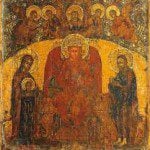 GOP Presidential candidate and former Pennsylvania U.S. Senator Rick Santorum recently made the sweeping claim that “I don’t believe in an America where the separation of church and state is absolute.” He added that John F. Kennedy’s speech on religion “makes me throw up.” Kennedy had called for an absolute separation in September 1960.
GOP Presidential candidate and former Pennsylvania U.S. Senator Rick Santorum recently made the sweeping claim that “I don’t believe in an America where the separation of church and state is absolute.” He added that John F. Kennedy’s speech on religion “makes me throw up.” Kennedy had called for an absolute separation in September 1960.
Prominent thinkers and Americans had this to say about the separation of church and state before John F. Kennedy:
- 1612 – “[The government representative] is not by virtue of his office to meddle with religion, or matters of conscience, to force or compel men to this or that form of religion, or doctrine: but to leave Christian religion free, to every man’s conscience …” John Smyth
- 1644 – “[The] wilderness of the world” [must be kept from compromising God’s] “garden and paradise.” Roger Williams
- 1689 – “All the power of civil government relates only to men’s civil interests, is confined to the care of the things of this world, and hath nothing to do with the world to come.” John Locke
- 1773 – Religious matters are to be separated from the jurisdiction of the state not because they’re interests of the state but, quite to the contrary, because they are too high and holy and thus are beyond the competence of the state.” Isaac Backus
- 1832 – “Religion … enjoys in this country … complete separation from the political concerns of the General Government.” Andrew Jackson
- 1874 – “The divorce between Church and State ought to be absolute.” James Garfield
- 1878 – Reynolds v. U.S. 98 U.S. 145 first time U.S. Supreme Court cites Jefferson’s wall of separation between church and state. The Court references the wall of separation in 1947 and 1948.
- 1880 – “Separation of church and state [are] among the elementary ideas of free institutions.” Rutherford B. Hayes
- 1920 – “. . . there must be no union between church and state, because their nature and functions are utterly different . . . Never, anywhere, in any clime, has a true Baptist been willing, for one minute, for the union of church and state, never for a moment.” George W. Truett
- 1930 – “. . . effects of these historical events are reflected in our National life . . . in Government through the principle of separation of church and state.”
There are actually many other comments about the wall of separation by prominent secular and religious leaders prior to John F. Kennedy that offer insight on the topic.
Historically, there are two overwhelming themes for the separation of church and state: keep faith from being soiled and misused by government; and from keeping one religion from persecuting another. It seems especially ironic that a very large percentage of cases brought to court are done by Christians being harassed or persecuted by other Christians.
In Everson v. Board of Education of Ewing Township 330 U.S. 1 (1947) the Court permitted government payment of busing students from public schools to parochial schools. In supporting this religious activity:
Catholics had persecuted Protestants. Protestants had persecuted Catholics. Protestant sects had persecuted other Protestant sects. Catholics of one shade of belief had persecuted Catholics of another shade of belief, and all of these had from time to time persecuted Jews. In efforts to force loyalty to whatever religious group happened to be on top and in league with the government of a particular time and place.
It’s worth examining some of the recent cases brought in the federal courts. Often it involved one Christian group seeking protection from another because they are incapable of loving one another.
It appears that Senator Santorum thinks that the metaphorical wall separating church and state is too high. Yet, by lowering it does it  mean “President” Santorum could legitimately codify or legislate his understanding of Catholicism that would be imposed on Baptists, Unitarians, Episcopalians, and members of the United Church of Christ? The wall of separation has more to do with protecting people of faith from one another than it does keeping faith out of government.
mean “President” Santorum could legitimately codify or legislate his understanding of Catholicism that would be imposed on Baptists, Unitarians, Episcopalians, and members of the United Church of Christ? The wall of separation has more to do with protecting people of faith from one another than it does keeping faith out of government.
Paul is author of Crucifying Jesus and Secularizing America – the Republic of Faith without Reason.











